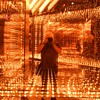Posted 5 years ago
 rniederman
rniederman
(347 items)
One of my camera collecting themes is to acquire and research examples that “broke the mold;” creative efforts to improve the quality and experience of picture taking. Over the years I’ve obtained historically noteworthy and imaginatively engineered cameras and this Focusing Weno Hawk-eye, by the Blair Camera Company, was an interesting attempt at a pioneering design. It eluded me for decades and the few available examples I’ve seen were, for lack of a better term, ratty. This one is in very nice condition.
Having been a working and art photographer in the past and taking pictures with equipment ranging from subminiature to 11 x 14 inch view cameras (including several antique cameras in my collection), I judge early equipment in terms of design, usability and practicality. Some are a joy to use while others leave me wondering what the builders had in mind. In general, all makers of early, and contemporary equipment, offer good and bad designs - George Eastman (Kodak) included. I’ve noticed that poor early camera designs sometimes lead to great improvements. Then again, I guess it’s true for most any consumer product.
In referencing the history of Blair equipment through its catalogues and examining examples in my collection, most were functionally straight-forward while others simply baffle me. Yet Thomas Blair’s imagination created some very unusual cameras. As with other builders, these nontraditional designs were probably byproducts of having to work around George Eastman’s masterful ownership and control of photographic patents (including cameras and film). While many of Blair’s large format view, detective, and later roll film cameras were very popular, his lesser known odder apparatus attempted to improve the amateur photography experience. One example, posted here on Show & Tell, is the incredibly rare [original] 1880 Blair Tourograph which I noted was unnecessarily complex for its intended use.
Which brings me to this obscure Focusing Weno Hawk-eye; a turn-of-the-century attempt to improve the humble folding (bellows style) roll film camera. During this time, the convenience and ease of using roll film was chipping away at an established market of bellows-based folding glass plate cameras. It was a time when technology was adapting to a growing, snapshot enthusiastic amateur market. And for a brief period of a couple years, a few makers attempted to build equipment with the best features of both plate and roll film cameras.
Blair’s Focusing Weno Hawk-eye appears to be one of the first (if not the first) cross-market designs which adds plate camera focusing precision (using ground glass) to a new style of all-in-one folding roll film apparatus. Blair’s Hawk-eye catalogue stated: A camera embodying all the best features of film and plate outfits, and can be readily termed “two in one.”
While folding roll film cameras were smaller and easier to use, getting precisely composed and focused pictures was difficult. Part of the problem was using small, bed mounted viewfinders. Focusing was done by guessing the subject distance and then moving the lens/shutter board to a corresponding point on a focusing scale.
In handling the Focusing Weno Hawk-eye, which is larger than a traditional folding roll film model, it works as advertised but I found it to be awkward. When using the ground glass focusing feature, preparing to take a picture is not easy. First, the camera’s entire roll film section must be lifted from the body and locked in place. This allows a spring-mounted frame with ground glass to move into the focusing plane. Next, same as a plate camera, the shutter is opened so that the dimly lit scene appearing on the ground glass can be carefully composed and focused.
Finally, to take a picture, the roll film back is dropped back into the body and a dark-slide, which keeps the film from being exposed while focusing and composing, is pulled up. That is a lot of juggling to get to the point of taking a picture, and it is likely the photographer accidentally moved out of position during the process. Otherwise, putting the camera on a tripod, not mentioned in the advertising, makes the entire process a little easier although slower. It is similar to how view cameras work; lots of planning and little spontaneity.
However, the Focusing Weno Hawk-eye can be used the same as the other folding roll film cameras. Not quite snapshot point-and-shoot ease because the dark-slide has to be raised for each picture being taken. Additionally, as an added convenience, a mechanical picture counter is built into the back. It advances when winding Blair’s daylight film for the next exposure; and it’s the only camera I’ve seen with this feature.
Two Focusing Weno Hawk-eye models appeared in 1902 and 1903 catalogues: No.3 (3¼ x 4¼ inch pictures on roll film) and No.4 (4 x 5 inch). In 1904, the “Combination Hawk-Eye Camera” (also posted here on Show & Tell) replaced the Focusing Weno. In addition to the ground glass focusing feature, it could use both roll film and glass plates. While this follow-on camera was smaller, could shoot plates mid-way through a roll of film, it was still complex to use.
The “combination” concept slowly died out even though a couple other companies, including Eastman Kodak, gave it a try. Overall, these styles of cameras were short lived and today are very uncommon or scarce. The No.3 listed for $27.50 in 1902 ($821.72 adjusted for 2020).







































stunning Rob!! and stay healthy!!
And I'm still trying to figure out my pc !
Thanks!
vetraio50
fortapache
Vynil33rpm
Thanks!
Michael
Newfld
MALKEY
Thanks!
BB2
Crazyguy
Ben
Sean
Thomas
Thanks!
Phil
mcheconi
bobby725
Lisa
Thanks!
MALKEY
yougottahavestuff
valentino97
f64imager
Thanks!
mtg75
JohnK
AntigueToys
Sunmoon2679
leighannrn
Thanks!
usedcarlady
MooreAntique
farmlady
snowman3
Thanks!
sanhardin
rustyboltz
oldpeep
Trey
Thanks, kwqd!